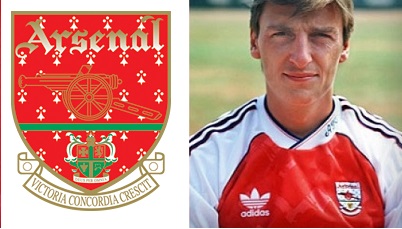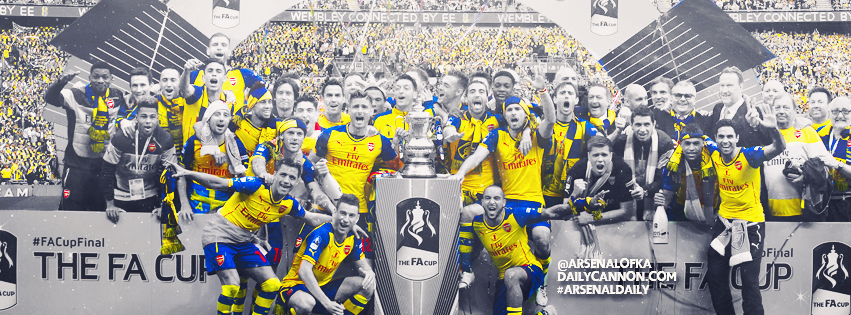by Matthew Wade
Most Arsenal fans of any pre-Wenger vintage will have firm memories of (and probably miss) the old Arsenal club crest, and its Latin motto, “Victoria Concordia Crescit”.
This is most directly translated as “Victory grows out of harmony”, but was often shortened to “Victory through harmony”.
Proudly adorning the team’s shirt and shorts in the 1990/1991 title winning season, it was the classical crest embossed on the breasts of our heroes almost as much as the memories that make it still my favourite kit today. And remarkably, I was still able to fit into it without too much of a squeeze for the cup final trouncing of Aston Villa.

Adopted in 1949 as a tribute to the collective approach of the first team, the old crest and the accompanying Latin (along with the coat of arms of the borough of Islington), was another element of the club having ‘a touch of class’ in the eyes of the footballing fraternity.
The irony was, however, that apart from an early burst of trophy success in the late 1940s and early 1950s, there was comparatively little victory and variable levels of harmony over the next two decades.
The revolving door of players that defined much of the late 1950s and 1960s settled down under the ill-fated tenure of former England and Wolves legend Billy Wright, where the club invested heavily, financially and emotionally, in youth development. This ultimately led to the success under Bertie Mee with a largely home grown squad, and created the framework for success at the end of the 1970s and the end of the 1980s.
Teams growing up together, with players respecting and understanding each other, and forming strong relationships off and on the pitch.
Despite a comparative lack of academy products, the same keys to success were illustrated in the pinnacles of Arsene Wenger’s early years, as evidenced by how many of the 1998, 2002 & 2004 players and staff are still in regular contact with each other.
Ultimately the old crest, like so many things cherished by most fans over the age of 35, fell foul of the financial realities of the football world of the 21st century. As reigning double winners in 2002, the old crest was abandoned. With elements incorporated from multiple different sources over the years it was impossible to copyright, not to mention more costly to reproduce due to its complexity, and it was replaced by the more visually impactful, if less interesting, crest of today.
All this is either interesting or terribly dull depending where you stand on club history, but, of course, what is more interesting is what this means for the immediate past, today and tomorrow.
Much of the last decade, ‘The early Emirates years’, have been characterised by instability in terms of the playing staff, and deep divisions within both the club ownership and the fan base. The last time before the last few months that it really felt like everyone was pulling in the same direction was in 2007/2008, spearheaded by the firm friendship bond between the midfield quartet of Cesc Fabregas, Mathieu Flamini, Alexander Hleb and Tomas Rosicky. As we know that title challenge was derailed by essentially losing half of the team to injury come the crunch time of the season, and the emergence of some of the problems which were to curtail that apparent progress.
Within a few months Hleb and Flamini had left for brighter lights and massive pay-rises, Emmanuel Adebayor’s ego had blown out of William Gallas’s mental unravelling accelerated, and Kolo Toure had become alienated. Other good eggs were struggling with injury, and kids like Nicklas Bendtner and Denilson thought they had made it too soon. In short the collective endeavour and ‘harmony’ within the team dissolved in what seemed no time at all. Despite the best efforts of leaders like Robin van Persie and Fabregas, the team drifted, devoid of a collective identity until they, for different reasons, decided to jump ship.
So far, so gloomy.
Thankfully, “times they are-a-changing”.
After the nadir of van Persie’s classless departure and subsequent title win at Old Trafford, the club has undergone an evolution.
At board level, for better or worse, the back-biting has calmed down, with the removal of dissenting voices towards our absentee landlord. While the lack of pronouncements from Kroenke can be frustrating and create concern over his long term intentions, his willingness to let Gazidis and the new commercial team basically get on with things has provided some much needed stability.
Within the team, the improved financial situation and accordingly a little transfer ambition have raised everyone’s hopes and expectations. Alexis Sanchez and Mesut Ozil have raised the bar, and the work ethic of the former seems to have galvanised that of the squad as a whole. Simultaneously, the weaker elements of the squad in terms of character, confidence or professionalism have slowly been eased out, creating an environment where everyone can be assured of the commitment levels of their colleagues.
Most importantly, the manager hasn’t had to sell anyone he didn’t want to since van Persie and Samir Nasri left. The club doesn’t need the money anymore, and bar the ongoing Theo Walcott situation (for which his injury provided mitigation), those behind the scenes have upped their game to ensure contracts are sorted out ahead of time.
The significance of this cannot be overstated. In almost any profession, the longer you know your colleagues, the more efficiently you can work together (assuming no major personal conflicts). As an actor I see this all the time. When you work as part of a company with the same group of people, you do develop a sort of vaguely telepathic shorthand, where one seemingly indistinct hand signal can effectively communicate five minutes of instruction. The most cohesive football teams say the same applies to their teammates movements and instincts. This is particularly important for Arsene Wenger’s managerial style, which eschews the orchestral precision of a Mourinho in favour of a more jazz-like improvisation of changing rhythms and individual creative expression around a general pattern. In the same way a group of musicians can create more exciting music when given freedom if they know how to read each other, the same applies to football. Mourinho’s teams are capable of creative brilliance, but more as the result of individual skills allowing a deviation from the established patterns. Wenger’s Arsenal are more likely to sore unexpected team goals, where three or four players do the unexpected together multiple times, almost like an improvised call and response.
https://www.youtube.com/watch?v=9GYx7U6RDY4
Of course it is not just on-field understanding that is the benefit of working together with the same group. I’m lucky enough to have been part of a couple of theatre companies where the vibe is very much one of ‘la familia’, and over the last year, a lot of Arsenal players have said the same about the environment around the team. It implies a sort of trust and mutual understanding that makes daily disputes or frustrations melt into insignificance because of the feeling of collective purpose and shared care.
It is key to being able to take the risks to create great theatre, and equally so in a truly collective team sport like football. All the most successful Arsenal teams in the last 30 years have been characterised by committed professionals pulling in the same direction, in the knowledge that their ‘mates’ have got their back on and off the pitch.
On all these fronts, things look good for Arsenal going forward.
None of the players want to leave, but all seem to share the same collective ambition. When we interviewed Nacho Monreal at the Puma kit launch event last week he offered some insights into the feeling within the camp:
“After Christmas the team was really strong we won 11 games or 12 games in a row, and we were the same players that started the season. For me the most important thing was the atmosphere in the group…because in the group, in the dressing room the atmosphere is amazing between all players. Before it was like, there were different groups. Obviously its normal, because in these things, where there are a lot of people of different countries, its normal for example, for the French players are off on one table, the English players, the Spanish players …But now, we are…there is just one group, and this is very important.”
We are of course used to Arsenal players talking about team spirit, but it feels different now. The players are queuing up to eulogise about the squad’s togetherness. Wenger describes it as ‘exceptional’ at the moment, as well as saying that it is the best since the 2004 group, who Thierry Henry has spoken eloquently about before:
“Key for me was the all-togetherness. What I liked about that team was the unselfishness of everybody. Everybody was willing to give the ball to the guy in the better position. The generosity of that team was outstanding, and we always wanted to share with each other. And that’s something that is pretty rare.”
A key indicator for me was the celebrations of those on the bench or not in the squad after the cup final. Everyone seemed fully engaged, particularly Kieran Gibbs and Flamini, both of whom have lost their places in the team in recent months.
Of course winning is a big part of this. As full houses and glowing reviews bring confidence and a sense of conviction in my profession, trophies and victories in big games do so for top level footballers. Hearing the players speak, it’s very clear that they all feel collectively engaged on what they are convinced in the right path. Last year’s getting over the trophy drought hump was massive for the psychology of the team, and the wins at the Etihad and Old Trafford this year, along with retaining the FA cup, have pulled the team closer together.
Off the pitch, behind the scenes whisperings about dissent within the coaching and medical set ups seem to have fallen silent. The manager has another two years on his contract and money so to spend if he wants to. He has the backing of the board, and crucially, currently has credit in the bank with the fans once more.
Which of course leads us to the supporters. Boy, have we been a divided bunch over the last three or four years. Arguments in the stands, recriminations on public transport recorded on mobile phones and tribal badges such as ‘Arsene Knows’ and ‘Wenger Out’ being adopted as labels for movements rather than just opinions. But thankfully, for the time being, things have calmed down. A couple of cup wins, some satisfying victories against our rivals and signs of clear progress, both tactically and in terms of squad development, have quietened the nay-sayers for the moment, and given millions of fans globally a sense of optimism for next year. Even Piers Morgan is keeping his trap shut.
So, for the first time in at least half a decade if not more, we have harmony largely across the board.
Will victory follow?

